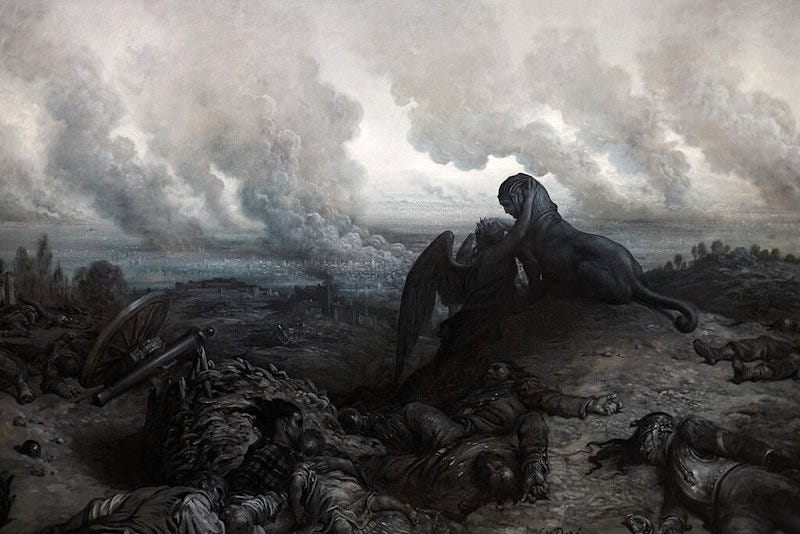Ligotti, Pessimism, Religion, and Horror
Full text of my recent interview for 'Rue Morgue' magazine
The horror magazine Rue Morgue ran an article on my What the Daemon Said in its most recent issue.1 Dejan Ognjanovic, who wrote the piece, conducted a short interview with me, and as usual my responses ran to greater length than what was needed. So, rather than let them molder in my out-box for all eternity, I’m sharing them with you, dear newsletter reader, since their topics and themes speak to matters of interest around here.
INTERVIEW FOR RUE MORGUE
November/December 2022
You have devoted quite a bit of your non-fiction to Thomas Ligotti. What has made this author so inspiring for you (more so than any other, it seems)?
When I first read Tom’s work, starting with his fiction collection Grimscribe, it was one of those transformative reading experiences where you realize in real time that you’ve discovered one of your life’s defining authors. Everything about his stories, from their content to their style, felt like it was speaking to me from the depths of my own soul and saying things I had been saying to myself unconsciously for years. At that time I had already written my first mature horror story, “Teeth,” three years earlier, and had poured into it a pessimistic and supernaturally nightmarish outlook that I only later discovered was the hallmark of Ligottian fiction. So, in short, Tom’s work resonates with me more deeply than that of any other fiction writer, even Lovecraft.
The depth of my response was also amplified in the early aughts when I started writing critical interpretive essays about his stories, motivated by the sense that I had a viscerally profound understanding of them, and then he and I became correspondents, at which point he told me that he, too, thought my understanding of his work was uncommonly penetrating. It felt then and still feels now like an amazing privilege to be able to interact with one of my literary icons while he’s still alive. Nearly all of the other other literary and intellectual/spiritual figures who make up my personal Mount Everest — Lovecraft, Blackwood, Alan Watts, Theodore Roszak, Huston Smith, Henri-Frederic Amiel, and a handful more — are all dead now, so I’ll never have that chance with them.
Some theoreticians believe the horror genre is an ideal “Trojan horse” for spreading pessimistic messages. Do you think this is true?
I’m aware of this line of thought, but it’s one with which I tend to disagree. I think pessimistic messages can be delivered effectively through all manner of genres. Sartre’s philosophical novels are evidence enough of that, though I suppose some people might be inclined to call Roquentin’s vision of the chestnut tree in Nausea and the accompanying realization of de trop, the superfluous too-muchness of existence, a kind of proto-horror in an ontological vein. And anyway, horror fiction can also be an ideal vehicle for spreading ultimately optimistic messages, such as Stephen King’s It, which, even though it’s essentially a Lovecraftian horror story expanded into a gargantuan mega-novel, ends on a decidedly and movingly hopeful note. And this is accentuated by the very fact of the manifold horrors that have preceded such a conclusion. From this one might just as well argue that horror is an ideal Trojan horse for spreading optimistic messages, because its very darkness offers an opportunity for pulling a reversal and contrasting this with a sudden eruption of light.



